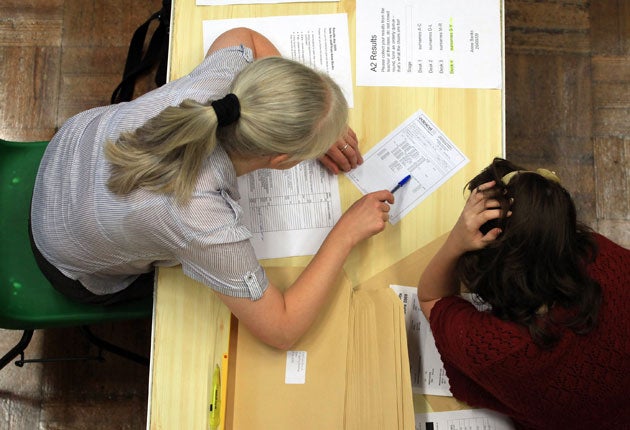University hopefuls add to their A-levels
Thousands of sixth-formers take on dissertations and community work to impress admissions staff

Thousands of A-level candidates have realised that relying on top-grade passes is not enough to secure a university place, results will show on Thursday.
Exam boards will reveal a "significant" rise in the number of university hopefuls doing voluntary dissertations for extended projects alongside three A-levels. One board has seen numbers soar by 50 per cent. In addition, they are volunteering for community work to make their CVs look more attractive to university admissions tutors.
The extended project – which reveals a student's creative writing and research skills – was first introduced a decade ago because the growing numbers of applicants predicted to get three A-grade passes was making it impossible for admissions staff to select the brightest candidates for the most popular courses, such as law and medicine.
This year's results are expected to show a rise in the percentage of A*- and A-grade passes – making selection more difficult. Oxford and Cambridge are expected to turn away at least 12,000 candidates with A* grades.
Andrew Hall, chief executive of the Assessment and Qualifications Alliance, the biggest exam board, told The Independent on Sunday: "There has been a surge in demand for the extended-project qualification."
There is also a growing demand for the AQA's new baccalaureate, awarded to candidates who have three A-level passes, have completed an extended project and undertaken community work. Entries are up 50 per cent this year – from 2,053 to 3,143. There has been a 63 per cent rise in the number of schools and colleges registering for the qualification – from 185 to 301 – despite, confessed Mr Hall, the board not pushing it "as hard as they could".
Figures show the unpaid community work done by sixth-formers is the equivalent of a £766,704 gift to the economy – based on the minimum wage for a 17-year-old.
Mr Hall conceded that 2011 had been "an unusual year" – not least because of the number of errors found in exam questions this summer. He said there were pressures on examiners who, as human beings, "made mistakes from time to time". But he admitted that "something got through". Students affected had been compensated with the award of full marks to some for the error-strewn questions.
As to the question of whether students should be allowed to apply to university after they have received their results instead of being awarded places based on provisional grades, he said: "My observation would be, if we're going to seriously look at this, it has to be a whole system reform."
Topics: Dissertations A-level students have written include
* Baron Haussmann's regeneration of Paris.
* An investigation of how John Williams' compositions convey emotions in film music.
* What is Einstein's special relativity and how has it influenced physics since?
* To what extent has J K Rowling's Harry Potter been inspired by classical literature?
* Does diumal variation influence performers' recovery heart rate after aerobic exercise?
* From Kyoto to Copenhagen and beyond – have the conferences really affected international action against climate change?
* Will it be another "barbecue summer"?
Extended projects normally consist of a 5,000-word dissertation, an artefact (such as a piece of music, sculpture or design) or a production (a play or event).
Join our commenting forum
Join thought-provoking conversations, follow other Independent readers and see their replies
Comments
Bookmark popover
Removed from bookmarks